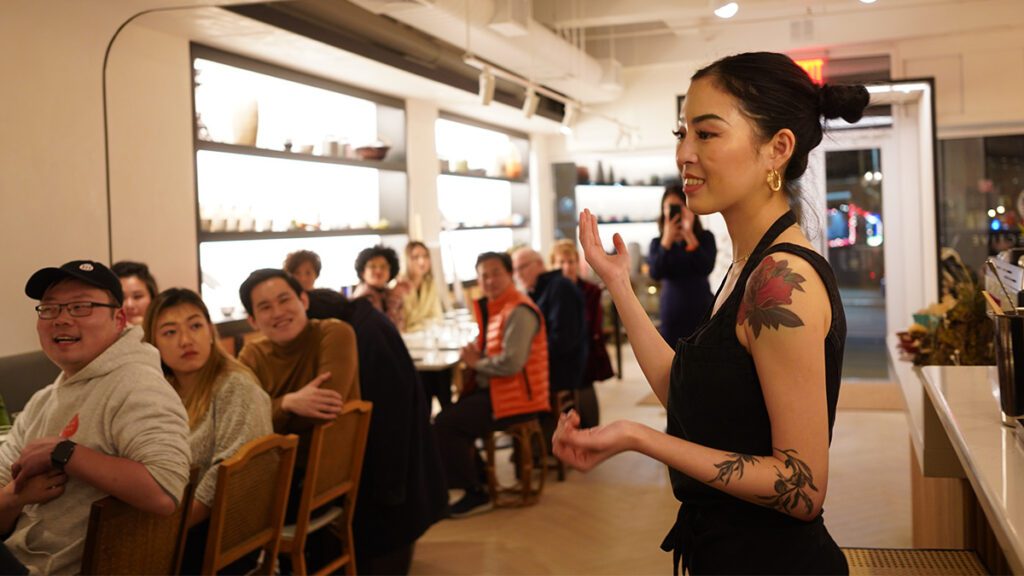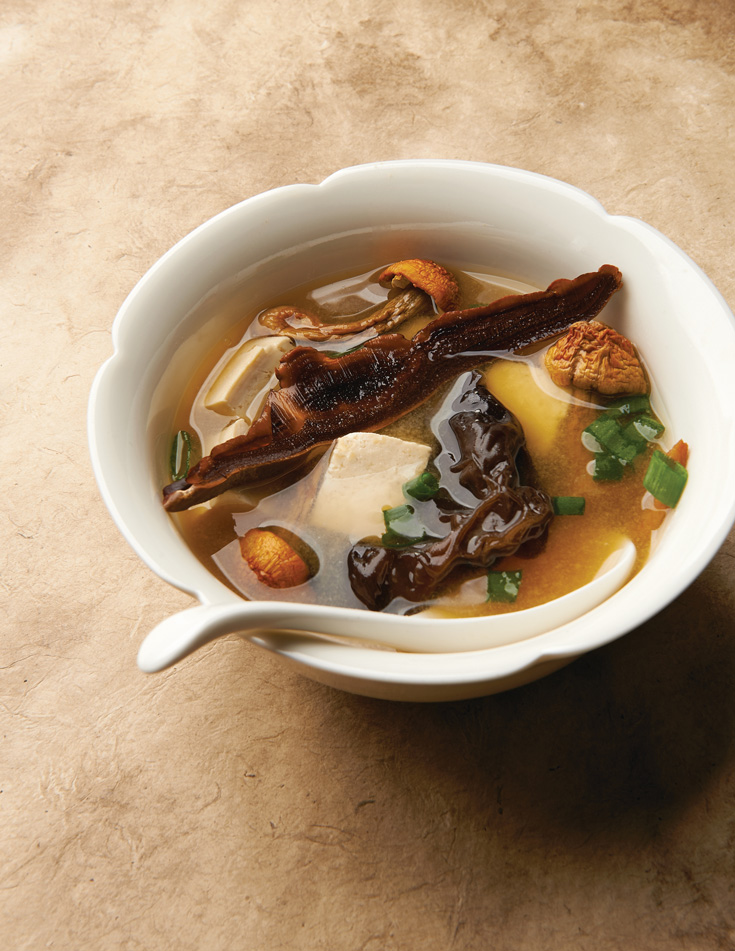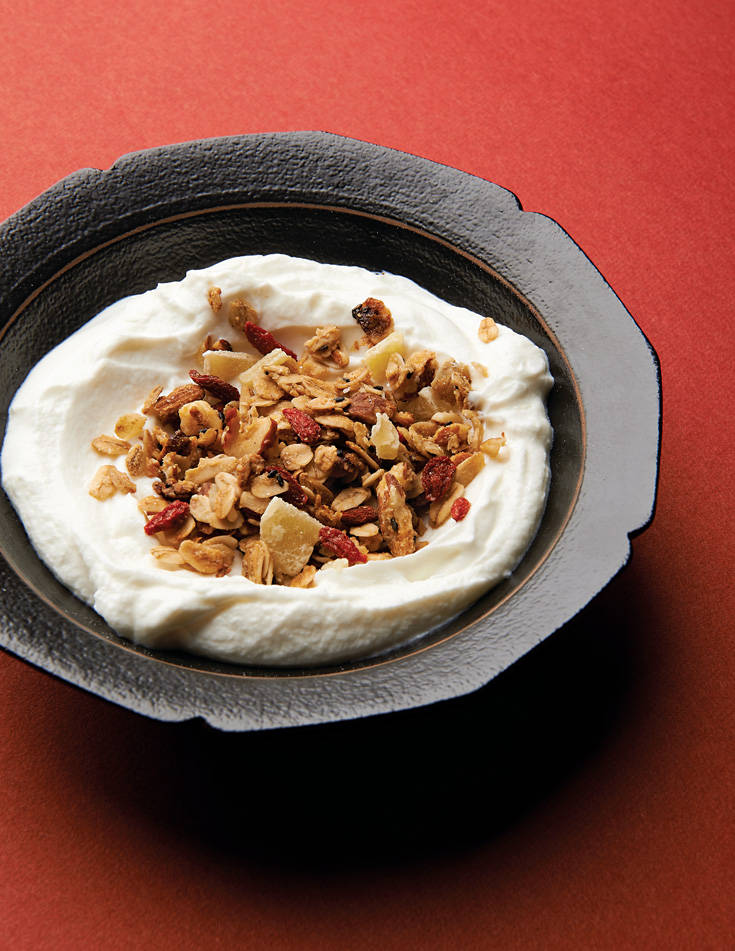Zoey Xinyi Gong is a chef and registered dietician specializing within the observe of Conventional Chinese language Drugs (TCM) meals remedy. In recent times, Gong has emerged as a distinguished determine on the earth of TCM, garnering consideration on social media for her accessible method to cooking with conventional herbs and elements. Her integrative, slow-food method to wellness has resonated with many, showcasing a conscious method of consuming that facilities non-Western and anti-appropriation approaches to diet.
TCM is a system that originated in China, popping out of thousands-year-old strategies of East Asian medical idea and observe. Those that aren’t aware of the time period TCM have most likely heard of acupuncture, moxibustion, qi gong, gua sha, and cupping. They’ve even perhaps tried conventional meals and herbs similar to reishi mushroom, goji berries, gingko nuts, and jujube dates with out realizing their cultural roots and medicinal properties.
Whereas some folks dismiss types of Chinese language drugs in right now’s biomedically centered world, others see studying about techniques like TCM as a technique to uplift cultural traditions, handle continual sickness, and construct an alternate understanding of their our bodies. Jap drugs practitioners similar to Gong see the physique’s mechanisms by way of vitality (qi), temperature (“sizzling” and “chilly”), the 5 parts, yin and yang, and a system of meridians that correspond to the organs.
The creator of The 5 Components Cookbook (Harper Collins, 2023), Gong showcases generally used East Asian elements similar to astragalus, Chinese language yam, honeysuckle, Job’s tears, and angelica root in her recipes. She additionally emphasizes joyful consuming, taking a mild stance towards one-size-fits-all weight loss plan developments.
Lion’s Roar spoke with Gong about her relationship to Buddhism, contemplative consuming, the significance of gorgeous meals, and her journey to understanding true wellness.
How did you first come to TCM?
It was really by my very own expertise of sickness that I got here to it. I bought actually sick after shifting to the USA from Shanghai once I was 16. For a number of years, I had a variety of various things occurring, together with continual joint ache, pimples, pores and skin rashes, amenorrhea, in addition to breast tumors. Ultimately, I noticed that the one technique to heal myself was to vary my complete life-style.
Did you develop up taking Chinese language drugs repeatedly?
It wasn’t an enormous a part of my life rising up. My grandma and uncle are literally biomedical medical doctors. That mentioned, I believe Chinese language drugs is part of each Chinese language individual’s life, even when we don’t discover it precisely. There are medicinal herbs used all through our meals and the medical phrases are sometimes a part of our language. I grew up understanding a variety of the philosophy behind it, with out actually studying something about Chinese language drugs itself.
“An method to weight loss plan can really be very adaptable and expansive, incorporating plenty of flavors, cooking strategies, and pleasure.”
After I began to get sick, the very first thing I regarded into was biomedicine and Western diet. To be trustworthy, I didn’t even know that it was doable to discover Chinese language drugs right here. Western diet did assist me, particularly with my pores and skin issues, however it by no means utterly solved what I might name “girls’s well being points” — I nonetheless wasn’t getting my interval. Fortunately the tumor in my breast was benign, however it will come again yearly, even after it was eliminated. I didn’t see long-lasting change till I attempted Chinese language drugs. I bought my interval again after simply ten acupuncture classes and one month of taking an natural components. After that, I actually needed to study extra.
After all I’m not excellent — I nonetheless have occasions once I don’t really feel the best, however after embracing a TCM method to meals, I really feel far more linked to my physique and comfortable, with out having to take care of a inflexible, restrictive life-style.
Though you’re firmly rooted in a observe of Chinese language meals remedy that has its personal explicit historical past, you additionally speak about how Buddhist teachings have knowledgeable your work as a chef and creator. You’ve posted an excerpt from Thich Nhat Hanh’s Tips on how to Eat in your web site.
Sure, it’s the “5 contemplations” of consuming, considered one of which is, “Might we acknowledge and rework unwholesome psychological formations, particularly our greed, and study to eat with moderation.” I believe lots of the points that folks have with their well being isn’t essentially nearly meals. It’s about their minds. What you eat instantly impacts the way you assume and really feel. When you begin to eat “dangerous meals” — meals that doesn’t suit your structure ultimately, or negatively impacts you — it may turn out to be this very sticky cycle that’s tough to take away your self from: the “dangerous meals” impacts your thoughts, and your thoughts impacts the way you select to eat.
Curiously, on the time I used to be probably the most sick and burdened, a pal gifted me a guide known as Zhāo Yīzuò Shēngmìng de Shān, by Taiwanese monk Li Hui Zhen. I don’t assume there’s an English model but. Mainly, I began studying it and couldn’t cease. It launched me to the concept we’ve the liberty to decide on a smart path of motion. Later, this concept helped me create a way of flexibility and relaxedness in my life, and I linked it to the philosophy of Chinese language drugs. Western diet and Western drugs don’t have the identical taste of freedom, since a lot of it’s about restriction, management, and specific directions: comply with the numbers, depend your energy, take your nutritional vitamins. However after I learn that guide, I noticed how restricted that is.
An method to weight loss plan can really be very adaptable and expansive, incorporating plenty of flavors, cooking strategies, and pleasure. Over time, as I found extra Buddhist teachings, my diet observe turned extra versatile; I began to have a extra open-minded and holistic method, for myself and for my sufferers. I began to really feel much less burdened and extra peaceable, capable of finding factors of calm in difficult eventualities.
Did you develop up Buddhist?
No. I had by no means regarded into Buddhism, ever. It appeared outdated to me, rising up in China. My household was not spiritual. Buddhism really appeared like one thing I might by no means, ever be into. Within the US in fact, there are dozens of standard books about Buddhism obtainable in bookstores, however in China, undoubtedly not. Now that I’m enthusiastic about it, although, my grandma would speak about praying to the Buddha, and at main occasions, we’d go to the native temple. I do keep in mind one pal in elementary faculty who would chant the Coronary heart Sutra, which is fairly generally recognized in China, despite the fact that most individuals can’t recite it from reminiscence. Ideas like doing good and selflessness are baked into the tradition to some extent, however generally Buddhism wasn’t taught or talked about a lot.
However proper after I completed Li Hui Zhen’s guide, I used to be like, “Wow, that is good things.” I began to eat extra Buddhist books — and naturally, discovered my technique to Thich Nhat Hanh’s Tips on how to Eat.
These days, when folks speak about their weight loss plan, they’re very burdened. There’s a type of hostile relationship between individual and meals: What ought to I eat? The whole lot is so unhealthy. The whole lot makes me really feel sick. However Thich Nhat Hanh’s phrases invite us into a hotter, extra inviting contemplation of our appetites. I needed to offer those that impression too — I didn’t need to simply blast them with, “Hey! Right here’s some free wholesome consuming suggestions!” Moreover, the 5 contemplations of consuming are relevant to all people, wherever you might be, no matter cultural background you come from.
Do you’ve got a particular gratitude observe round meals?
Probably not, not explicitly. However I suppose I at all times have gratitude in my thoughts at any time when I prepare dinner — it’s type of constructed into the circulate of my observe. I attempt to honor the elements by minimizing meals waste within the kitchen, and once I prepare dinner meat, I make the most of the entire animal for the dish, ensuring to make use of the bones to make broth. I additionally use all the vegetable. I’m very consciously attempting to maneuver away from what I see within the meals and beverage trade, which is, generally, extremely wasteful.
In the identical vein, a variety of your writing and work pushes again towards the thought of “superfoods,” and extractive methods of approaching what are thought of “ethnic” elements.
Sure. I can say that Chinese language meals remedy isn’t an extractive type of philosophy. It’s about utilizing what you’ve got in entrance of you. These days, a variety of standard wellness recommendation may be very a lot about what: what’s on this, what’s good, what ought to or shouldn’t I eat.
A greater, extra healthful technique to method life is to grasp how your physique reacts to issues, and to understand how you should utilize this data to attain a way of stability. For me wellness isn’t very concrete; it’s not the issues. Maybe that is just like typical Buddhism knowledge: don’t focus an excessive amount of on materials issues.
I needed to contextualize the herbs and strategies in my cookbook by weaving in Chinese language historical past, folktales, and private tales pertaining to the elements. I needed to make them extra alive, relatively than simply writing “reishi = immunity, adaptogenic,” and so on. For people who find themselves new to TCM, it’s additionally simpler to recollect the elements in the event that they’re talked about with extra vividness. I used to be actually impressed by Yang Xiao Lu, a guide of Chinese language recipes from the Qing dynasty (1636-1912).

One of many first stuff you point out in your cookbook is joyful consuming. Are you able to say extra about that?
Within the US we’re taught that “maintaining a healthy diet” and pleasure have completely nothing to do with one another. It’s both/or: I both need to eat “clear,” or I need to fill my abdomen with one thing that tastes improbable. We take into consideration pleasure by way of fast pleasure: the consolation meals, the very candy, very oily issues that immediately fulfill us. So I speak about joyful consuming by way of happiness each within the current second and the long term — taking the time to study what nutritious meals style good to you and what you want, and the best way to put together them in a conscious method.
Slowing down is important; many individuals chug protein shakes or ginger pictures, however how does this actually make your physique really feel? Taking the time to make meals look pleasing to the attention is vital and helps calm the nervous system. We eat with all of our senses, that’s only a reality. Scrumptious smells, and the sounds of crunching or slurping prompts our urge for food. Our physique guides vitality towards the digestive system to course of the meals higher. Visually, our mind loves coloration. It’s stimulated by a stunning plate of meals with completely different colours and textures. You may sense the meals is well-prepared and nutritious; you are feeling the sense of being taken care of. However, in case your meals is constantly very bland, it may actually affect your digestion. I noticed this usually once I labored as a nutritionist in a hospital. Sufferers got plates of white and yellow mushes, however over time this had a dangerous affect on their want for meals. In conventional Chinese language dietary tips, one of many prime standards for meals remedy is to verify your affected person’s meals appears nice.
It usually looks as if this celebration of, and aesthetic consideration to meals is ignored in most Western diet fashions. I’ve heard some diet professionals speak about an 80/20 “rule” — encouraging us to punish ourselves more often than not, with a view to “indulge” 20 p.c of the time.
Completely. While you speak about well being over right here, it’s at all times about “detox.” Western diet is never about nourishing or the idea of replenishing. In Chinese language drugs, it’s a lot about replenishing: tonifying qi, tonifying blood. Detoxifying formulation and meals are utilized in particular circumstances, when you’ve got a variety of extra, particularly what’s known as extra warmth. In any other case, it’s normally higher to tonify. And the factor about these tonifying meals, is that they’re heat. Detoxifying meals are all very chilly, and have a tendency to take rather a lot out of our physique.
I see my sufferers and mates eat a variety of salad and different chilly meals, and it usually provides them indigestion or bloating. What’s attention-grabbing is that they at all times blame themselves: “It’s my abdomen, my digestion may be very weak.” They by no means assume, “Oh, it’s the salad that’s making me really feel this fashion,” as a result of within the West salad is taken into account so wholesome that no person questions that it’d not be good for you. In response to Chinese language drugs, it’s really fairly onerous for our bodies to interrupt down an enormous quantity of uncooked meals in a single sitting. I normally counsel switching to soups or issues which are warming and simpler on the abdomen.
What I’m saying pertains to self-reflection, which is one thing I discovered by my encounters with Buddhism and training meals remedy. It may be a useful observe to do a short meditation on what you eat on daily basis. Oftentimes we don’t keep in mind what we ate yesterday or this morning. It’s one technique to construct self-awareness and to begin noticing the small moments of discomfort we really feel or the adjustments in our physique. This consciousness, I believe, may also help stop a variety of illness. Ache and continual sickness don’t simply begin like that. They normally start with small alerts that we ignore.
As a chef and dietician, you’ve talked brazenly in regards to the area of diet and the way overwhelmingly white it’s, and the way this could affect how non-Western meals are stigmatized or misunderstood. Do you see this altering in any respect?
I don’t see it altering any time quickly, at the very least on the macro degree. In science and in scientific observe, diet training might be going to proceed being taught in the identical method. Nevertheless, on a client degree, extra persons are demanding culturally related, versatile, and holistic approaches to their well being, and are paying extra consideration to the seasonality of elements and the way they’re sourced.
The unhappy factor is, world wide, issues are evolving to resemble Western-style diet, even in international locations with wealthy traditions of delicacies and meals remedy similar to China. It’s very disappointing for me to see, however I perceive why. Western diet may be very straightforward to market, very straightforward to speak about. Doing one thing like TCM meals remedy — there’s an enormous studying curve. It’s important to perceive the philosophy behind it to begin to “get” it; it requires extra time, consideration, and observe. However a Western dietary mannequin, it’s straightforward. You comply with the principles. You don’t have to consider something; it’s normally an inventory of do’s and don’ts. Folks are likely to gravitate towards what’s simpler to grasp. It takes extra time and house to study ideas like yin nourishing, chilly within the spleen and abdomen, dampness, and blood deficiency.
How else does Buddhism inform your life and work?
For a very long time I’ve been actually into Tibetan thangkas, and after shifting to New York Metropolis as an grownup, I began visiting the Rubin Museum and smaller galleries like Tibet Home. I’ve a tattoo representing the three poisons (greed, hatred, and delusion) on my stomach, and a Tibetan three-bladed dagger [Tibetan: phur ba; Sanskrit: kila], which symbolizes slicing by them.
My curiosity in Buddhism has been fairly eclectic; I really first discovered in regards to the three poisons at a Korean temple in Manhattan throughout their New 12 months’s Eve ceremony a number of years in the past. I keep in mind considering, that makes a lot sense—all our dangerous emotions stem from these three issues. Now, at any time when I really feel annoyed or dangerous ultimately, I attempt to categorize my emotions into the three poisons.
I’m conscious there are various faculties and branches of Buddhism, and in the intervening time I really feel open to studying from all of them. From what I’ve seen, publicity to Buddhist concepts and philosophy adjustments folks’s relationships to weight loss plan for the higher, with out ever having to study one thing particularly about meals. I believe the affect is unconscious — there’s a method wherein the teachings plant these seeds in your thoughts which may not manifest at first, however finally, they make sense, or begin to affect your lived conduct ultimately.
Recipes
Strive these two recipes from The 5 Components Cookbook.
Reishi Mushroom Miso Soup
Whether or not it’s made by a Michelin-star restaurant or your native takeout joint, miso soup is at all times so comforting for each our Coronary heart and digestive system. This miso soup recipe incorporates many various sorts of mushrooms so as to add further umami taste and adaptogenic qualities. The addition of reishi, relying on the range and type you utilize, could give this soup a barely bitter aftertaste. If that bothers you, you possibly can skip it and nonetheless make a therapeutic bowl of miso soup.

5 Components: Water, Hearth, Earth
Seasonality: Chilly, Heat, Humid, Dry
Energetics: Impartial
Meridian Affinity: Coronary heart, Abdomen, Kidney
Capabilities: Aids Digestion, Calming
Yield: 6 servings
Time: 2 hours
10 dried or recent black wooden ear mushrooms
3 dried shiitake mushrooms 1 hand-size piece kombu
3 items (6 grams) reishi or 2 teaspoons reishi extract
3 teaspoons gluten-free soy sauce
2 teaspoons mirin
2 tablespoons sake
3 medium jujube dates (15 grams), pitted and halved
8 cups bone broth or vegetable inventory
2 teaspoons sesame oil
1 teaspoon finely minced ginger
1/2 pound assorted recent mushrooms, thinly sliced
3 tablespoons white or pink miso paste
1/2 block (8 ounces) silken tofu, cubed
Sea salt, to style
2 tablespoons chopped scallions, for garnish
- Rigorously wash the dried wooden ear mushrooms and soak in heat water for 1 hour in a medium mixing bowl. Drain. The wooden ear mushrooms broaden considerably after soaking. If utilizing recent black wooden ear mushrooms, you do not want to soak them.
- In a big soup pot, add the soaked wooden ear mushrooms, dried shiitake mushrooms, kombu, reishi, soy sauce, mirin, sake, jujube dates, and broth. Carry to a boil over medium warmth. Scale back the warmth to low and simmer, coated, for half-hour. Pressure the bottom broth by a fine-mesh sieve into a big mixing bowl.
- Minimize the cooked kombu into strips and put aside. Reserve the jujube dates and discard the remainder of the solids.
- Within the empty soup pot, warmth the sesame oil over medium- excessive warmth and prepare dinner the ginger till aromatic, about 1 minute. Add the sliced recent mushrooms and prepare dinner for 1 minute. Pour within the ready base broth and produce to a boil. Ladle 1/2 cup of the broth right into a small bowl and add the miso paste. Stir and let the miso paste utterly dissolve within the broth. Pour the miso combination again into the soup pot. Add the cubed silken tofu and cooked kombu. Simmer for one more 5 minutes. Season with sea salt.
- Ladle the soup into 6 bowls and serve heat, garnished with the chopped scallions.
Sesame Goji Granola
I had by no means had granola earlier than I got here to the USA, however as quickly as I attempted it for the primary time, I undoubtedly fell in love. It’s crunchy, candy, nutty, and simply excellent with yogurt. The addictive style does include the lower than best incontrovertible fact that store-bought granola is usually very excessive in sugar and fats, which might be simply adjusted if we make our personal at house. This can be a quite simple and fast recipe for granola that has a TCM twist to it to tonify Qi and Blood and heat our physique. The aroma of sesame oil pairs effectively with the light sweetness of goji berries and jujube dates. These spiced oats are crunchy, fragrant, and satisfying to have at any time of the day!

5 Components: Steel, Wooden, Water
Seasonality: Chilly Energetics: Warming
Meridian Affinity: Lung, Liver, Kidney
Capabilities: Warming, Tonifies Qi and Blood
Yield: 2.5 cups
Time: half-hour
2 cups rolled oats
2 tablespoons black sesame seeds
1/2 cup chopped walnuts
2 teaspoons (5 grams) five- spice powder or floor cinnamon
3 tablespoons mild brown sugar, or to style
1 tablespoon finely minced ginger or ginger paste
1 tablespoon sesame oil
1/2 cup plant-based butter or grass-fed butter, melted
1/2 cup (25 grams) pitted and chopped jujube dates
1/4 cup (25 grams) goji berries
- Preheat the oven to 350°F.
- Place all of the dry elements, besides the jujube dates and goji berries, into a big bowl and blend. As soon as effectively mixed, incorporate the ginger, sesame oil, and melted butter and toss till the dry elements are evenly coated, then unfold the combination in a single layer on a half baking sheet lined with parchment paper.
- Place the baking sheet within the oven and bake the granola till golden brown, about 20 minutes. Halfway by baking, give the combination a stir to make sure even toasting. Three minutes earlier than the tip of baking, add the jujube dates and goji berries and proceed to bake. Preserve an in depth eye on the granola and berries within the final 3 minutes as a result of they will simply burn at this stage.
- Take away the sheet from the oven and let the granola cool utterly. Get pleasure from with yogurt, milk, or candy porridge. Retailer at room temperature in an hermetic container for as much as 6 months.


